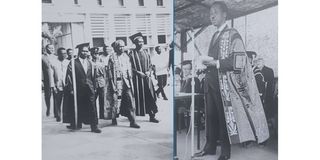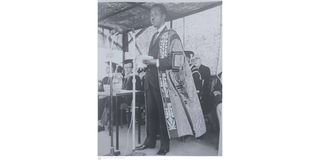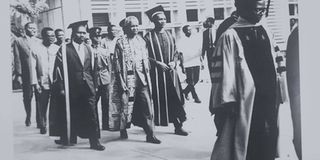Prime
Mwalimu Nyerere’s 23 honorary degrees and 15 prestigious awards unveiled

What you need to know:
- From Harvard University in the United States to Cairo University in Egypt and Makerere University in Uganda, the breadth of institutions that honoured Mwalimu reflects his stature as a global intellectual and moral leader.
Dar es Salaam. Mwalimu Julius Kambarage Nyerere, Tanzania’s founding father and a towering statesman of 20th-century Africa, is widely celebrated for leading Tanganyika (later Tanzania) to independence and championing Pan-African unity.
But what many may not know is the scale of international recognition he received throughout his lifetime—from prestigious academic institutions and global organisations alike.
A newly published book, Julius Nyerere: A Photographic Journey, launched on Union Day 2025, sheds light on this lesser-known side of Mwalimu’s legacy.
The book, a stunning visual and narrative tribute to his life, leadership and legacy, documents for the first time a comprehensive list of 23 honorary degrees and 15 international awards bestowed upon him—testaments to his influence not only across Africa but around the world.
Nyerere a global scholar
From Harvard University in the United States to Cairo University in Egypt and Makerere University in Uganda, the breadth of institutions that honoured Mwalimu reflects his stature as a global intellectual and moral leader.
In the United States alone, he was recognised by Harvard, Howard, Lincoln, and Claremont Graduate University, among others.
The book reveals that as early as 1966, he was awarded an honorary degree from the University of Edinburgh—the institution where he completed his undergraduate studies in the 1940s.
Other recognitions followed from Toronto University, University of Monrovia, Universities in the Philippines, University of Ibadan and Nsukka in Nigeria, National University of Lesotho, University of Fort Hare in South Africa, and multiple Tanzanian institutions including University of Dar es Salaam, Sokoine University of Agriculture, and the Open University of Tanzania.
Among the more unique accolades were honorary doctorates awarded by Pyongyang University in North Korea, and Havana University in Cuba, recognising his unwavering commitment to global justice and non-alignment during the Cold War.
“These degrees were not merely ceremonial—they were endorsements of Nyerere’s deep moral convictions, intellectual clarity, and transformative leadership,” noted Prof Palamagamba Kabudi, one of the book’s contributors.

Mwalimu Nyerere delivers the inauguration speech at the opening of the new University College in Dar es Salaam.
Beyond academia
Beyond the academic accolades, Mwalimu Julius Nyerere was also honoured with 15 prestigious awards and medals from governments and international organisations around the world, underscoring his global stature as a statesman and humanitarian.
Among the most notable was the Lenin Peace Prize, awarded in Tanzania in 1987, which recognised his lifelong dedication to peace and justice. He also received the Dag Hammarskjöld Prize for Universal Merit in Belgium, acknowledging his commitment to global diplomacy and multilateral cooperation.
In Cuba, he was awarded the Order of José Martí, one of the country’s highest honours, while India recognised his internationalist values with two major awards: the Nehru Award for International Understanding in 1976 and the Third World Prize in 1982.
His advocacy for displaced communities earned him the Nansen Medal for Services to Refugees from UNHCR in 1983. Additionally, Nyerere received the Eduardo Mondlane Medal from Mozambique and the Great Collar of the Aztec Eagle from Mexico, both acknowledging his unwavering support for liberation movements and solidarity with the Global South.
The book’s release serves as a powerful reminder of the respect and admiration Nyerere commanded across continents—for his advocacy of human dignity, liberation struggles, anti-imperialism, and a vision of African socialism rooted in justice and community.

Vision still reverberating
In her foreword to the book, President Samia Suluhu Hassan pays tribute to Nyerere’s intellectual and moral compass, noting that his values continue to guide Tanzania’s governance to this day.
The book also features touching tributes from Mama Maria Nyerere, former presidents Ali Hassan Mwinyi, Benjamin Mkapa, and regional icons such as Kenneth Kaunda of Zambia.
With its rich photographs and historical detail, Julius Nyerere: A Photographic Journey does more than capture the public life of Mwalimu—it immortalises a legacy of humility, scholarship, and visionary leadership.
As Nyerere himself once remarked: “We, the people of Africa, will fight and work together to bring an end to injustice and inequality everywhere.”
More than two decades after his passing, this new publication proves that Mwalimu’s voice—and the global recognition he earned—still resonate profoundly.





